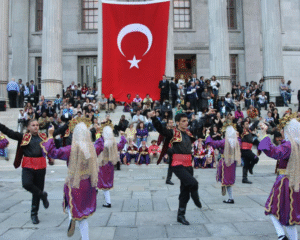Introduction
For many Russian speakers moving to Turkey, the adjustment feels easier than relocating to Western Europe or North America. The language is different, sure, and the lifestyle takes a few turns, but there’s a kind of warmth and rhythm to Turkish life that can feel surprisingly familiar. Still, once you settle in and start living day-to-day, the cultural differences begin to reveal themselves in unexpected ways.
From how people interact in shops to how neighbors greet each other, from navigating public spaces to understanding local humor, Turkish culture brings its own unwritten rules. While many expats do eventually find their groove, it helps to know in advance which moments might take you by surprise.

A More Expressive Kind of Politeness
If you’re used to the more reserved tone that’s typical in Russian-speaking regions, Turkey’s social energy can be a bit overwhelming at first. Turkish people speak with animated voices that rise and fall, hand gestures fly, and personal space often shrinks. People here aren’t shy about asking questions either. You may be asked how much you pay for rent, if you’re married, or why you live alone, not to be rude, but out of genuine interest.
This directness coexists with a surprising softness. Turkish culture puts strong emphasis on courtesy, especially in public. You’ll hear people say “thank you” and “excuse me” often. They address elders with respectful titles and speak more gently with strangers than what some Russian speakers may be used to. It’s a balance between warmth and boundaries that takes a bit of learning.
Hospitality Means More Than a Cup of Tea
The concept of hospitality in Turkey goes far beyond offering someone tea or coffee. It’s an entire cultural system, one that comes with expectations. If you visit someone’s home, they may insist you stay for dinner, even if you just dropped by. Refusing food repeatedly may not go over well; saying “I’m full” isn’t always accepted the first time.
Hospitality is also shown in business. Shopkeepers often offer tea, even if you’re just browsing. In larger cities, this might be less common, but in towns and neighborhoods with fewer tourists, it’s still deeply part of everyday life.
That said, this doesn’t always mean you’ve formed a deep connection. Many Russian speakers mistake Turkish warmth for lasting friendship. In reality, it may just be a surface-level kindness. The distinction can be hard to recognize at first.

Time and Structure Feel Different
Time in Turkey operates on a different rhythm. Schedules are more flexible, plans change often, and appointments may not start exactly when expected. Even government offices, while officially structured, often require a bit of patience. Waiting, re-confirming, or even returning the next day is not unusual.
This can feel chaotic to someone coming from a more rigid or punctual environment. But over time, many Russian speakers find themselves adapting to learning to build in extra time and approach bureaucracy with a sense of calm persistence rather than confrontation.
Religion in Public Life
Although Turkey is a secular republic, Islam is present in everyday life in ways Russian speakers might not be used to. You’ll hear the call to prayer multiple times a day. During Ramadan, public eating and drinking during daylight hours may feel a bit awkward in some neighborhoods, even if it’s technically allowed.
That said, religion is not forced on foreigners. Turks tend to be tolerant and are proud of their hospitality toward outsiders. You’re not expected to follow Islamic practices, but showing awareness and small signs of respect, like not being loud near a mosque, goes a long way.
Humor and Communication Styles
Humor is another place where cultural gaps can create confusion. Russian humor is often dry, deadpan, or even a little dark. Turkish humor tends to be more expressive, sometimes playful or slapstick, and much less sarcastic. What feels funny in Russian may come across as too blunt or even rude in Turkey.
More than humor, even daily communication tends to be more indirect. Turks often avoid direct refusals or criticism. You might hear phrases like “we’ll see” or “maybe later” instead of a hard no. For Russian speakers, who are typically more direct, this can be frustrating. Learning to read between the lines and recognizing when someone is politely declining becomes a useful skill.
Gender Norms and Social Roles
Gender roles are also a space where cultural differences become noticeable. Turkish society, especially outside of the big cities, tends to have more traditional views on gender behavior. Men may take on more visibly dominant roles in public, and women, while present and active, often dress more conservatively and behave with more caution in mixed settings.
This isn’t necessarily restrictive, but it does mean Russian-speaking women, especially those used to greater independence or more liberal norms, may need time to adjust. Likewise, Russian-speaking men may find it useful to understand how traditional masculinity plays out in Turkish culture, especially when it comes to family life or dating.
A Few Common Misunderstandings to Watch For
When Russian speakers first settle into life in Turkey, these common points of friction tend to come up:
- Confusing friendliness with deep personal interest. Just because someone is warm doesn’t mean they’re offering long-term friendship or serious romantic intentions.
- Mistaking indirect communication for indecision. Often, politeness prevents a direct “no.”
- Feeling frustrated by loose timelines. Delays are normal; they’re not necessarily a sign of disrespect.
- Assuming secular laws mean secular attitudes. Cultural conservatism exists even in modern settings.
Final Thoughts
Adjusting to life in Turkey doesn’t require changing who you are. But it does mean observing how people relate to each other and making small shifts to better connect. For Russian speakers, especially those coming from larger cities or former Soviet regions, some parts of Turkish culture will feel familiar, like the deep-rooted hospitality and strong family values. Others, like the expressive communication and fluid sense of time, might take a little more getting used to.
The good news is, Turkish people are generally patient with foreigners. They understand you’re learning, and most are eager to help when they see you trying. A few Turkish words, a relaxed attitude, and genuine curiosity will carry you a long way.
And in time, the differences stop feeling foreign. They just become part of the daily rhythm, a new way of living that might even suit you better than the one you left behind.
